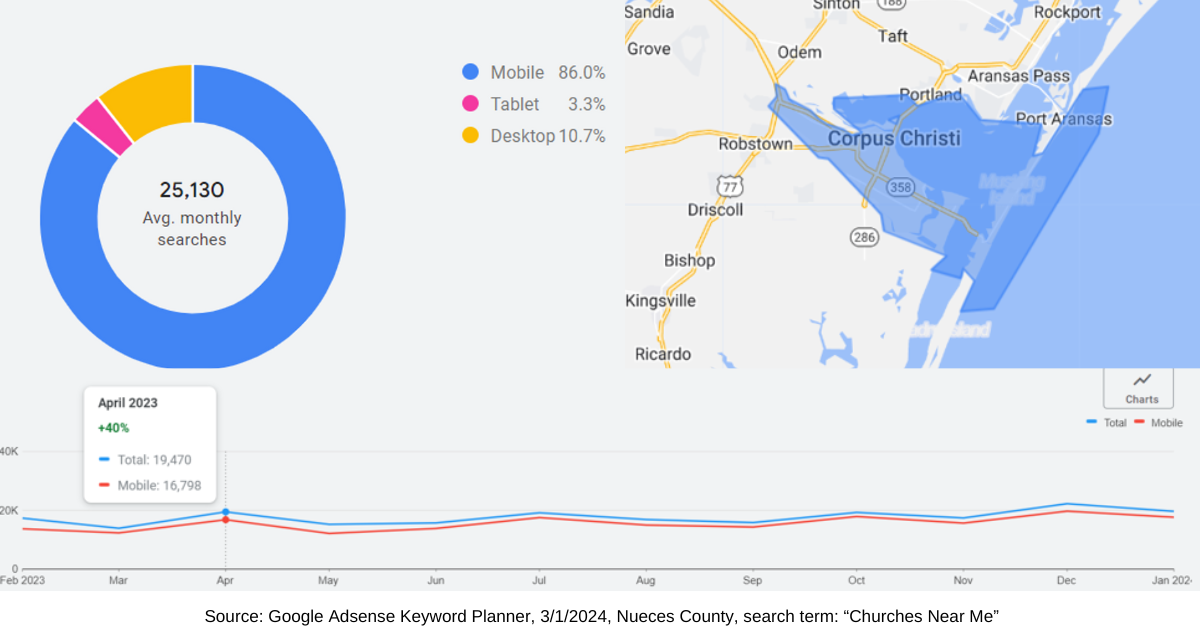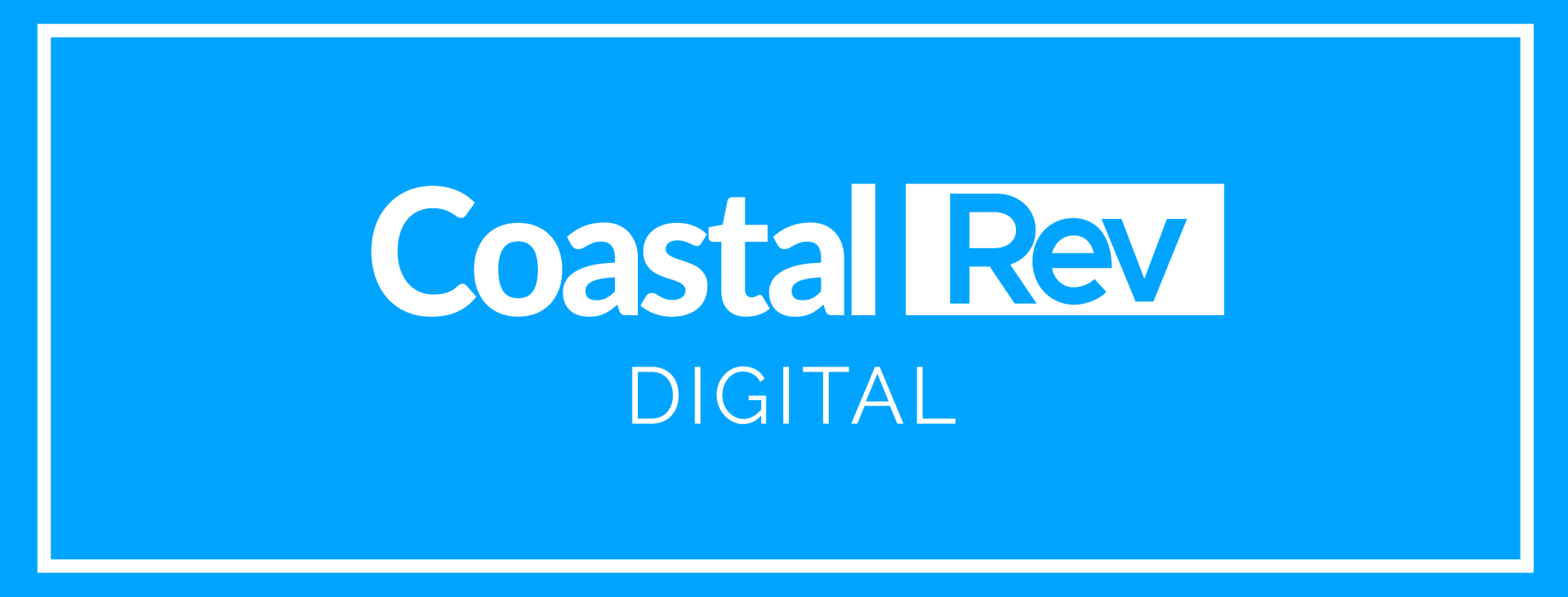Does your Church really need a website?
Understanding Why it's Important to Market your Church Online
One of the biggest challenges facing churches today is trying to attract the "Goldilocks" family of parents in their mid-30s with children. As churches try to navigate attracting that key millennial audience, it is important to understand their habits.
Looking at just a small area in Texas of Nueces County (located in Corpus Christi Texas) you can see how many searches there were for "Churches Near Me" in just Nueces County Texas. With 86% of all searches coming from mobile devices and an average search volume of over 25,000 in just Nueces County, the overall growth speaks for itself. According to Wikipedia, Nueces County has a population of just 353,178.

Church Websites Design
The foundation of any successful online marketing strategy is the design of your website. Your church's website serves as the digital hub for your ministry, providing visitors with essential information, resources, and opportunities for engagement. This is where your millennial family will most likely start their journey, especially if they're new to the area and looking for a new Church home. Here are the key elements to consider when building a website for your church:
- Clear Navigation: Make it easy for visitors to find what they need by organizing your website's content into clear and intuitive navigation menus. Include sections for essential information such as service times, location details, upcoming events, and ministry opportunities. Another thing to keep in mind is to base this around your target audience. If you want more young families with children, talk about your daycare services on the first page, don't make them hunt for it.
- Compelling Content: Create engaging and informative content that reflects the values and identity of your church. Include pages dedicated to your church's history, beliefs, and leadership team; it's also vital to include resources such as sermons, blog posts, and study materials. This is often overlooked by most Church websites. What makes you special, what makes your ministry different than the others?
- Visual Appeal: Invest in professional design elements that reflect the aesthetic and personality of your church. Use high-quality images, videos, and graphics to enhance visual appeal and create a welcoming atmosphere for visitors.
- Mobile Optimization: Looking at the information from Nueces County Texas, we can see that 86% of all searches for "Churches Near Me" were done from a mobile phone. Ensure that your website is optimized for mobile devices to accommodate the growing number of smartphones and tablets online. A mobile-responsive design ensures that your website looks and performs flawlessly across all devices, providing a seamless user experience for visitors on the go.
DIY or Hiring a company for your website development
Do-It-Yourself website development for Church website design
If you are a DIY kind of church and want to pursue creating your church website on your own, four main things are vital to begin the process.
- Domain Name Purchase: the first step in your process to a good church website is to figure out what kind of domain name you'd like your church to have. A domain is the URL of your business, for example: CoastalRevDigital.com. This domain could be purchased through your website development platform but often can be purchased separately through third-party platforms like GoDaddy.com. Domains are usually purchased on an annual basis and costs start at around $12/year.
- Hosting Your Website: Your website has to be "hosted" through someplace. This is a monthly recurring fee that you will have to pay to keep your website live so that Google and other search engines can find it. Often your website development platform will offer hosting in addition to creating the website. If you go with a platform like WordPress that does not offer hosting, you will need to find a hosting platform to house your website. One of the largest WordPress hosting sites is Blue Host.
- Creating Your Church's Website: The third piece of the puzzle is creating your website. This is where the rubber meets the road and you will have to create all of the content and differing pages for your website. It's important to separate each page as its separate entity. Each page should solve a major question that a potential member could have. This is where you want a little knowledge of basic Search Engine Optimization to ensure each of your website's pages is answering a potential question. For example, if you offer marriage counseling, you don't want to accidentally show up for divorce.
- Index Your Website: What good is a website if you can't find it on search engines like Google and Bing? Search engines are just a virtual library so you have to "index" your website with these search engines to make sure they can find you. Most modern website development platforms will do this automatically, but it's something to be aware of.
Some of the obvious advantages to developing the website on your own would be cost and total control over your website. However, if you are not familiar with Search Engine Optimization (SEO) basics like indexing your site correctly or how to optimize your site for your particular members, it will be difficult to show up on search engines.
If you want to go the DIY route there are a few website creation platforms that we have used in the past and we will give you the Pros and Cons of each.
Developing your Churches website with WIX.com
Pros:
- User-Friendly: Wix is a very user-friendly platform that allows you to create a website with basic knowledge. If you can effectively create a PowerPoint presentation then you can marginally get through creating a good-looking website. This is a great "for beginners" platform.
- All-in-One: Through Wix, you never have to leave the platform for all four of the steps above. You can purchase your domain, host your website, create the website, and even index the website.
- Built-in Basic SEO Tools: Through the Wix platform they offer basic SEO tools to help your website get found.
Cons:
- More Challenging to SEO: This platform gives you a great base-level website but when it comes to SEO it can be a little more challenging to rank high for particular keywords.
- Limited Customizability: Because Wix was built for the beginner it has a lot of "training wheels" that limit the amount of customized work you can do on your website. Think of it kind of like the Apple Store on your iPhone. If you want to put a custom tool on your website (like a donation platform that you prefer) it can often become very challenging because oftentimes you have to go through their approved "apps".
Overall, Wix is a solid platform for someone not very knowledgeable about website development in a smaller town that isn't facing much competition. It can be a great starting tool if you have the time and are willing to watch a few YouTube videos on how to build out some sites. Just be aware that the actual key to being found online isn't just a website, but all of the back-end SEO that goes into developing the website. Having a great website without SEO is like having a Ferrari without an engine.

Developing your church website with WordPress
Pros:
- Extremely customizable: WordPress is one of the most customizable platforms when it comes to website development. There are no "training wheels" here. This platform will allow you to code and plug in just about any customizable App or widget you could dream of.
- SEO Friendly: WordPress has some excellent SEO widgets, or apps, that will help guide you on a little basic SEO. One of the most widely utilized SEO widgets for WordPress is Yoast Analytics.
- Scalable: Since WordPress is such an open-ended website platform you can scale your website from a small website to almost as large of a website as you'd like.
- Templates Available: There are templates available for purchase from independent companies that can help you get a good starting point.
Cons:
- Can Be Difficult to Use: Going down the path of using a WordPress platform to build out your website, you will need a little more about HTML coding. You won't need to be an expert coder, but you will need to understand some basics because it can be easy to accidentally "break" the website code.
- Not all-in-one: WordPress is only step 3 in the process of building your website. If you choose to go down the path of using WordPress for your church website, you will need to know how to purchase a domain name, and then point that domain with DNS to your hosting platform. It sounds more intimidating than it is. If you have the time to watch a few YouTube videos, it's not too complicated.
Conclusion: WordPress is an excellent platform for building a small to large-scale church website if you have a little technical know-how. This is a scalable platform that you can grow with and expand as your church expands. You do need to know a little HTML and the full process of domain purchasing, hosting, to DNS pointing your domain in the right direction. This wouldn't be the platform we would suggest you start with if you have little online website development experience.
Hiring a Church Website Development Company
A well-designed and high-functioning website is critical to the overall success of a local church. However, as we previously stated, building a church website requires more than just basic web development skills. It demands a deep understanding of the unique needs and objectives of a religious organization and can navigate the crucial steps to build a strong online foundation. That's where hiring a professional church website development company can make all the difference.
Here are compelling reasons why your church should consider partnering with a professional company for its website development:
- Expertise in Church Website Development: Professional companies specializing in church website development possess the expertise and experience to create tailored solutions that meet the specific requirements of religious organizations. They understand the nuances of designing a website that effectively communicates the church's mission, values, and activities to both members and visitors.
- Customized Solutions: A one-size-fits-all approach won't suffice when it comes to church websites. Professional development companies can create customized solutions that reflect the unique identity and branding of your church. From incorporating church logos and colors to integrating features like event calendars, online giving options, and sermon archives, a professional team can tailor the website to your precise needs.
- User-Friendly Design: Navigating a church website should be intuitive and user-friendly for visitors of all ages and technological abilities. Professional developers are skilled in creating user interfaces that are easy to navigate, ensuring that visitors can access information about services, events, and ministries with minimal effort.
- Mobile Optimization: With an increasing number of people accessing the internet through mobile devices, church websites must be optimized for mobile responsiveness. Professional developers understand the importance of responsive design and can ensure that your website looks and functions flawlessly across all devices, including smartphones and tablets.
- Search Engine Optimization (SEO): Building a beautiful website is only half the battle; ensuring that it's discoverable online is equally important. Professional development companies have expertise in SEO techniques that can improve your church website's visibility in search engine results, making it easier for people to find your church when they're searching for local religious organizations.
- Security and Maintenance: Keeping a website secure and up-to-date requires ongoing maintenance and monitoring. Professional development companies provide robust security measures and regular updates to protect your church website from potential threats and vulnerabilities, giving you peace of mind knowing that your online presence is secure.
- Technical Support and Training: Even the most well-designed website may encounter technical issues from time to time. Professional development companies offer technical support services to address any issues promptly and ensure minimal disruption to your website's functionality. Additionally, they can provide training to your staff or volunteers on how to update and manage the website effectively.
- Focus on Ministry: By outsourcing website development to a professional company, your church leadership and staff can focus their time and energy on core ministry activities, rather than getting bogged down in the complexities of website design and maintenance. This allows your church to devote more resources to serving the spiritual needs of your congregation and community.
Investing in a professionally designed and developed website is a wise decision for any church looking to enhance its online presence and effectively engage with its members and the broader community. By partnering with a church website development company like Coastal Rev Digital, you can benefit from their expertise, customized solutions, and ongoing support, ultimately helping your church fulfill its mission in the digital age.
CONTACT US
SIGN UP FOR OUR NEWSLETTER
We will get back to you as soon as possible
Please try again later

